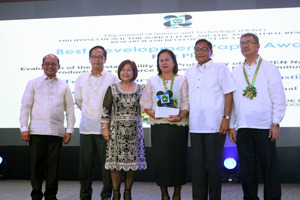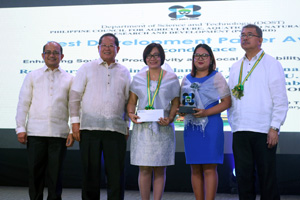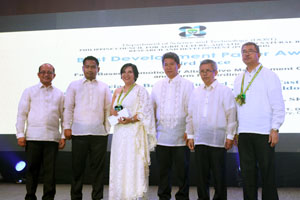 A joint project of the Western Mindanao State University (WMSU) and San Ramon Prison and Penal Farm (SRPPF) titled, “Evaluation of the Sustainability and Profitability of ZAMPEN Native Chicken Production as a Source of Livelihood in Rural Communities” won 1st place with a cash prize of ₱150,000 for topping the Best R&D Paper Awards, Development Category during the National Symposium on Agriculture, Aquatic and Natural Resources Research and Development (NSAARRD). The project is led by Dr. Teresita A. Narvaez, Consortium Director of the Western Mindanao Agriculture, Aquatic and Natural Resources Research and Development Consortium (WESMAARRDEC).
A joint project of the Western Mindanao State University (WMSU) and San Ramon Prison and Penal Farm (SRPPF) titled, “Evaluation of the Sustainability and Profitability of ZAMPEN Native Chicken Production as a Source of Livelihood in Rural Communities” won 1st place with a cash prize of ₱150,000 for topping the Best R&D Paper Awards, Development Category during the National Symposium on Agriculture, Aquatic and Natural Resources Research and Development (NSAARRD). The project is led by Dr. Teresita A. Narvaez, Consortium Director of the Western Mindanao Agriculture, Aquatic and Natural Resources Research and Development Consortium (WESMAARRDEC).
The project confirmed the potential of ZamPen native chicken in providing sustainable livelihood to rural communities in Zamboanga Peninsula. Based on the project, ZamPen native chicken is more profitable by 26% on hardened chicks and 86% on slaughtered chicken. Moreover, ZamPen has 80% fertility and hatchability, as well as 90% survival rate.
Read more about the project here: http://www.pcaarrd.dost.gov.ph/home/portal/index.php/quick-information-dispatch/3220-zampen-native-chicken-to-provide-sustainable-livelihood-to-rural-communities-in-zamboanga-peninsula

Meanwhile, the project, “Enhancing Soybean Productivity and Local Availability in Region 2” won 2nd place with a cash prize of ₱125,000 in the Best R&D Paper Awards, Development Category. The project was led by Rose Mary G. Aquino.
The project addressed the almost zero production of soybean in Cagayan Valley as recorded in 2010 by creating awareness on the importance of soybean for human, livestock, soil health, and nutrition. With the promotion and adoption of organic production farming and good agricultural practices, through the project, soybean yield increased from 1,250 kgs/ha to 2,175kgs/ha, providing the farmers with a net income of Php 40,000 from Php19,000/ha. As of 2017 about 1,750 hectares of the land in Cagayan Valley had been planted to soybean.
Read more about the project here: http://www.pcaarrd.dost.gov.ph/home/portal/index.php/quick-information-dispatch/3222-da-bar-project-provides-recipe-for-a-rewarding-soybean-production-in-cagayan-valley

Lastly, the project, “Farm-based promotion of alternative management options and farm-recording” won 3rd place with a cash prize of ₱100,000 in the Best R&D Paper Awards, Development Category. The project was led by Dr. Patricia M. Barcelo, Juvidel Jaye P. Castillo, Neal del Rosario, Rolando Hipe, Reynaldo T. Intong, and Nathaniel Naanep.
The program developed a curriculum called the Farmer Livestock School on Goat Enterprise Management (FLS-GEM) to improve the goat raisers’ awareness on matured technologies on goat management. It was used to train farmers across the country in 2013 to 2016. The FLS-GEM is described as innovative and technically feasible, socially and politically acceptable, profitable and effective. These advantages of the program are shown by the extent of its adoption by goat raisers and institutions and the support of local government units. But more than anything else, the success of the curriculum becomes more visible in terms of the gains in goat production such as increase in conception rate, shortened kidding intervals, reduced pre-weaning mortality, and consequently more income to the raisers. The curriculum also gave rise to additional enterprises such as the sale of forage planting materials and use of goat waste as organic materials.
Read more about the project here: http://www.pcaarrd.dost.gov.ph/home/portal/index.php/quick-information-dispatch/3225-fls-gem-improves-goat-farms-and-increases-awareness-about-s-t-based-goat-farm-production
Organized by DOST-PCAARRD, the NSAARRD recognizes the outstanding contributions of individuals and institutions in improving the state of R&D in the country for the interest of the agriculture, aquatic and natural resources sector.
Held at the Philippine International Convention Center, the NSAARRD’s recognition and awarding ceremonies, as a yearly activity, highlighted the 7th Year Anniversary Celebration of the Philippine Council for Agriculture, Aquatic and Natural Resources Research and Development of the Department of Science and Technology (DOST-PCAARRD).
